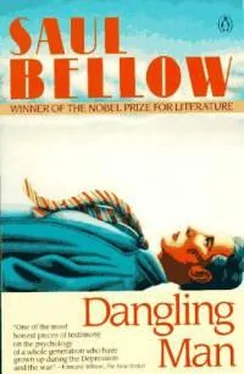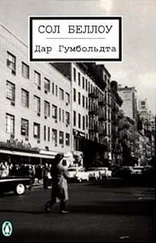Сол Беллоу - Dangling Man
Здесь есть возможность читать онлайн «Сол Беллоу - Dangling Man» весь текст электронной книги совершенно бесплатно (целиком полную версию без сокращений). В некоторых случаях можно слушать аудио, скачать через торрент в формате fb2 и присутствует краткое содержание. Жанр: Современная проза, на английском языке. Описание произведения, (предисловие) а так же отзывы посетителей доступны на портале библиотеки ЛибКат.
- Название:Dangling Man
- Автор:
- Жанр:
- Год:неизвестен
- ISBN:нет данных
- Рейтинг книги:4 / 5. Голосов: 1
-
Избранное:Добавить в избранное
- Отзывы:
-
Ваша оценка:
- 80
- 1
- 2
- 3
- 4
- 5
Dangling Man: краткое содержание, описание и аннотация
Предлагаем к чтению аннотацию, описание, краткое содержание или предисловие (зависит от того, что написал сам автор книги «Dangling Man»). Если вы не нашли необходимую информацию о книге — напишите в комментариях, мы постараемся отыскать её.
Dangling Man — читать онлайн бесплатно полную книгу (весь текст) целиком
Ниже представлен текст книги, разбитый по страницам. Система сохранения места последней прочитанной страницы, позволяет с удобством читать онлайн бесплатно книгу «Dangling Man», без необходимости каждый раз заново искать на чём Вы остановились. Поставьте закладку, и сможете в любой момент перейти на страницу, на которой закончили чтение.
Интервал:
Закладка:
February 16
O. r Ms. KIER'L is, as Mrs. Bartlett puts it, "sinking PDQ. She can drag along for a week or two weeks, but this" rain dumb show she sank a needle into her arm "can't keep her going forever." We walk through the house gingerly. Captain Briggs no longer goes oddut for his evening smoke. It is too cold.
February 17
Ivt ru i have grown closer. Lately she has been remarkably free from the things I once disliked so greatly. She does not protest against this rooming-house life; she seems less taken up with clothes; she does not criticize my appearance or seem disturbed because my underwear is in such a state that in dressing I often put my leg through the wrong hole. And the rest: the cheap restaurant food we eat, our lack of pocket money. Yet she is as far as ever from what I once desired to make her.
I am afraid she has no capacity for that. But now I am struck by the arrogance with which I set people apart into two groups: those with worth-while ideas and those without them.
February 18
YESTERDAY, passing the bush on which I found the stolen socks, I saw a second pair.
Vanaker must have taken several. I pointed them out to Iva as we passed this evening. She, too, recognized them. She says we should find a way of showing that we are aware of the theft.
February 19
Arcoa'rIERT letter from John Pearl" asking for news of Chicago. As if I had any to give him. I know no more about it than he does. He wanted to go to New York but now sounds nostalgic and writes with deep distaste about his "peeling environment."
"Peeling furniture, peeling walls, posters, bridges, everything is peeling and scaling in South Brooklyn. We moved here to save money, but I'm afraid we'd better start saving ourselves and move out again. It's the treelessness, as much as anything, that hurts me. The unnatural, too. human deadness."
I'm sorry for him. I know what he feels, the kind oi terror, and the danger he sees of the lack of the human in the too-human. We find it, as others before us have found it in the last two hundred years, and w bolt for "Nature." It happens in all cities. And cities are "natural," too.
He thinks he would be safer in Chicago, where he grew up. Sentimentality! He doesn't mean Chicago. It is no less inhuman. He means his father's house and the few blocks adjacent. Away from these and a few other islands, he would be just as unsafe.
But even such a letter buoys me up. It gives me a sense of someone else's recognition of the difficult, the sorrowfulIn what to others is merely neutral, the environment.
February 22
IF I HAD To As" Raison..4ussi with me today, I could tell him that the highest "ideal construction" is the one that unlocks the imprisoning self.
We struggle perpetually to free ourselves. Or, to put it somewhat differently, while we seem so intently and ever desperately to be holding on to ourselves, we would far rather give ourselves away. We do not know how. So, at times, we throw ourselves away. When what we really want is to stop living so exclusively and vainly for our own sake, impure and unknowing, turning inward and self-fastened.
The quest, I am beginning to think, whether it be for money, for notoriety, reputation, increase of pride, whether it leads us to thievery, slaughter, sacrifice, the quest is one and the same. All the striving is for one end. I do not entirely understand this impulse. But it seems to me that its final end is the desire for pure freedom. We are all drawn toward the same craters of the spirit-to know what we are and what we are for, to know our purpose, to seek grace. And, if the quest is the same, the differences in our personal histories, which hitherto meant so much to us, become of minor importance.
February 24
HEAVY snowfall last night. I skipped lunch, to avoid wetting my feet three times in one day.
February 27
ONLY twenty-two days until spring. I swear that on the twenty-first I will change from my winter clothes and, no matter what the weather is like, even if there is a blizzard, I will walk through Jackson Park hatless and gloveless.
ADLER showed up, at last. He came in the middle of the afternoon, when I was not expecting him.
Mrs. BaLlett had let him in and, I gathered, cautioned him against making noise, for when I saw him on the landing he was walking on tiptoe.
"Who's sick, Joseph?" he asked with a look back at Mrs. Bartlett, who was softly monitoring the street door. The pneumatic arm that shut it was out of commission.
"The landlady. She's very old."
"Oh-oh! And I rang twice," he said guiltily. I motioned him into the room. He was much disturbed. "Do you think I shouldn't have?"
"Everybody rings the bell. How do you suppose people get in here? Don't worry about it."
Adler was very spruce, in a wide-shouldered coat and a tweed suit, new style, without cuffs. He looked fresh and healthy. His hat with its blunt crown was new also, and very stiff. It had cut a red line into his forehead.
"Sit down, Mike," I said, clearing a chair for him. "You've never been here before, have you."
"No," he said, and he inspected the room, hardly able to conceal his surprise. "I thought you had an apartment."
"Our old apartment? We gave that up long ago."
"I know. But I thought you were living in one of those furnished flats."
"It's snug here."
It's true, the room did not look its best.
Marie had cleaned it, after a fashibn, but the coverlet was wrinkled, the towels on the rack looked as though they had not been changed for weeks, Iva's shoes under the bed showed a crooked line of heels. The day, too, was not altogether favorable. The sky hung low, loose, with blemished clouds that spotted the street from curb to horizon with shadows. And the weather intruded into the room. The walls above the radiator were as dirty as the snow in the yard, and the linen-the dresser scarf and the towels-seemed spun out of the same material as the sky.
"You've been here since last fall, haven't you?" he said. "Since June," I corrected.
"Nearly nine months."
"Is it that long?" he said unbelievingly. "Almost the tenth."
"And there's nothing new?"
"Do I look as if I were concealing something new?" I exclaimed. This startled him. I relented and said, "Noth. ing's been changed."
"You don't have to take my head off because I ask."
"Well, you see, everybody asks the same question. You get tired of answering. I have this routine to do, over and over and over. Questions are fired at me, and I'm supposed to scramble like a retriever, fetching answers. Why? Well, if I don't I won't get a certificate of politeness.
Hell!"
Adler's color changed, so that the dent the hat had made above his eyes showed white.
"You're not very generous, Joseph."
I did not reply. I looked down at the street, the yards, at the masses of snow like dirty suds.
"You've changed a lot. Everybody says so," he went on more calmly.
"Who?"
"Why, people who know you."
"I haven't seen anyone. You mean that business in the krrow."
"No, no: that was only one case."
"I wasn't all wrong in the Arrow."
"You're becoming bad-tempered."
"Good I I am. Now, what do you want me to do? Did you come to tell me that I was bad-tempered?"
"I came to see you."
"That's mighty handsome of you."
In rising anger, he stared at me, his mouth pursing. I began to laugh, and at that he rose and made for the door. I pulled him back.
"Here, don't go, Mike. Don't be a ool.
Sit down. I wasn't laughihg at you. I just happened to think that I'm always hoping a visitor will come. When he does come I insult him."
"I'm glad you see it," hemuttered.
"I do see it. Certainly I see it."
"Why jump on people? Good Lord '@.
"It just turns out that way. As the French say, "c'est plus fort que moi." Does that prove that I'm not happy to see you? Not at all. It's. n really a contradiction. It's natural. Almost a welcome, one might say."
Читать дальшеИнтервал:
Закладка:
Похожие книги на «Dangling Man»
Представляем Вашему вниманию похожие книги на «Dangling Man» списком для выбора. Мы отобрали схожую по названию и смыслу литературу в надежде предоставить читателям больше вариантов отыскать новые, интересные, ещё непрочитанные произведения.
Обсуждение, отзывы о книге «Dangling Man» и просто собственные мнения читателей. Оставьте ваши комментарии, напишите, что Вы думаете о произведении, его смысле или главных героях. Укажите что конкретно понравилось, а что нет, и почему Вы так считаете.







